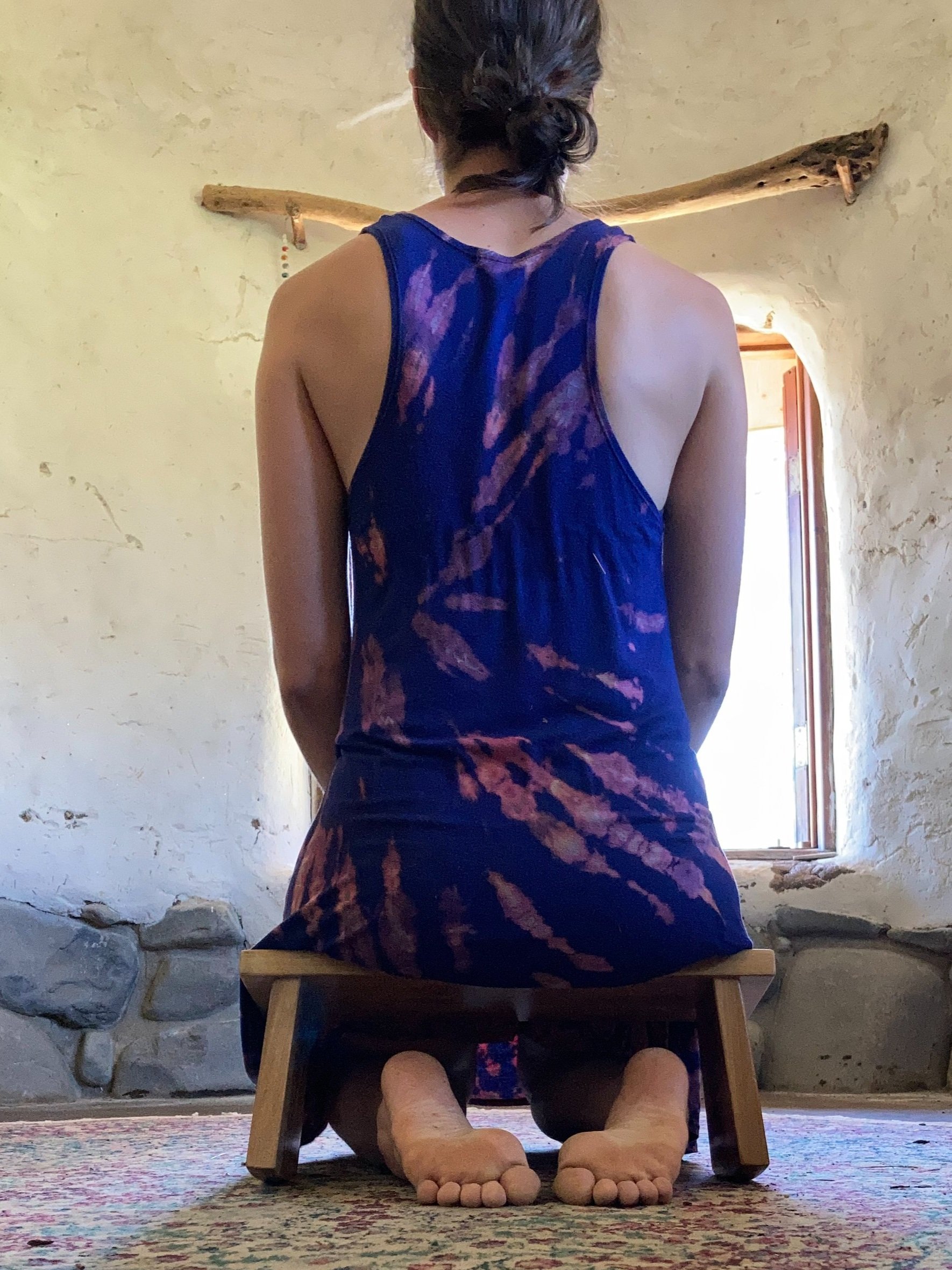Wow, could it really be that simple?! No shame, no drama, no self-loathing, no elaborate systems, no rewards or punishments?!
Cheri Huber’s work helped me begin realizing that this attitude was ineffective, harmful and indeed interfering with my ability to make changes in my life that I truly wanted to make (like establishing a regular meditation practice).
And so I began a 5 day per week Vipassana meditation practice. I remember using a paper calendar (and stickers) to track the early phase of my practice as it was first becoming established. I’m pretty sure I started small (5-10 minutes) and worked my way up to 20 minutes over time (where I plateaued for many years before bumping up to 30 minutes only within the past few years). Somewhere along the line I purchased my own navy cotton zafu (meditation cushion) and eventually transitioned to using a low meditation bench (now my legs never fall asleep).
In 2016 I discovered that Margaret Townsend, a local breathwork facilitator, was co-leading an 8-week Mindful Self-Compassion (MSC) course and I knew I desperately wanted to attend. The course was based on the work of Drs. Kristin Neff and Christopher Germer, the pioneering researchers and clinicians who founded the Center for Mindful Self-Compassion. We focused on simple but effective concepts like, “What do I need?” and “What do I long to hear?” We experimented with which of the MSC practices resonated with us the most (affectionate breathing, compassionate friend, self-compassion break, and soothing touch are a few of my favorites). The course culminated in a half day retreat. This course was powerful beyond words–soothing, healing, vulnerable. I wholeheartedly believe that self-compassion (which is at the root of compassion for others) has the potential to change the world.
Last April I decided to attend my first weeklong retreat at Cloud Mountain in SW Washington. In the days leading up to the retreat I was absolutely terrified. My fear of the unknown really wanted to be heard. What would come up? What if I couldn’t handle it? A week without reading, writing OR talking?! It ended up being wonderful in an unparalleled kind of way. A week to “drop out” of day-to-day life and focus entirely on my practice. By the end I even experienced extended periods where my mind’s chatter stopped and I was able to focus completely on my breath (something I haven’t been able to replicate much outside of retreat). I’m already scheming to figure out when I’ll be able to attend again.
The retreat inspired me to switch from sitting five days a week to every day. Something about incorporating meditation into my daily routine was exactly what I needed. I realized that I had leaned too far into the phrase “recommitting is the point” and that I could bring more discipline and awareness to what constituted a reasonable reason not to meditate (travel? A long day hiking? Not feeling great?). I downloaded the Habit Tracker app which inspired my longest streak yet–172 days (which eventually ended).
Don’t get me wrong, almost 10 years later meditation is still not “easy.” Sometimes I spend an inordinate amount of time avoiding the simple act of sitting down on my bench. I’ll tidy the house, start a load of laundry, realize I’ve waited too long and now need to eat breakfast, receive a distracting text or email–you name it. But engaging in this practice is one of–if not the–most important things I’ve ever done. The practice of becoming acquainted with the habits and process of my mind and nourishing curiosity for my own experience is something I’m not sure I could have cultivated any other way. I’ve done this enough to now know (most of the time) that things will pass–the itch, the impulse, even the worry. Now, it’s really easy to see when others are being unkind towards themselves and easiER (not easy) to notice when I’m being unkind towards myself.
“Many of us subscribe to the belief that spiritual growth happens as a result of daily meditation, mindfulness retreats, and inspiration from wise luminaries. But one of the greatest teachers you could ever hope to learn from is living right under your roof, even if (especially if) he or she pushes your buttons or challenges your limitations… True spirituality doesn’t happen in a cave at the top of a mountain. It’s down here, wiping a runny nose, playing yet another round of Candyland, or rocking a colicky baby at two in the morning. The Buddha is crying in the next room. How you handle that is as evolved and as spiritual as it gets. ”
I have spent 8 of the past 10 years caring for children and my meditation practice has been the ABSOLUTE most important factor influencing my ability to stay calm and show up with patience and presence for the young humans in my life. My practice has helped me hold space through tantrums, separation anxiety, impulsive behaviors, and sibling squabbles. My practice has helped me know when to step in and offer help as well as helping me know when to step back and observe. I’ve learned how to soothe myself as children have been inconsolable or simply taken on bold physical challenges. I’ve practiced holding a child’s (or children’s) needs simultaneously alongside my own as well as tending to my own fatigue, overwhelm, and frustrations.
I can’t tell you how meditation will impact your life. All I can do is share my experience and let you know that it’s one of the best gifts you’ll ever give yourself. It’s never too late to start.
I’d love to hear about your journey with mindfulness. Do you have a practice? If so, what resources have been essential to your journey? If not, do you dream of starting one? Are you not quite sure where to begin? Let’s chat!

